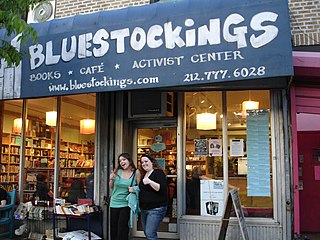Queercore is a cultural/social movement that began in the mid-1980s as an offshoot of the punk subculture and a music genre that comes from punk rock. It is distinguished by its discontent with society in general, and specifically society's disapproval of the LGBT community. Queercore expresses itself in a DIY style through magazines, music, writing and film.

Lesbian feminism is a cultural movement and critical perspective that encourages women to focus their efforts, attentions, relationships, and activities towards their fellow women rather than men, and often advocates lesbianism as the logical result of feminism. Lesbian feminism was most influential in the 1970s and early 1980s, primarily in North America and Western Europe, but began in the late 1960s and arose out of dissatisfaction with the New Left, the Campaign for Homosexual Equality, sexism within the gay liberation movement, and homophobia within popular women's movements at the time. Many of the supporters of Lesbianism were actually women involved in gay liberation who were tired of the sexism and centering of gay men within the community and lesbian women in the mainstream women's movement who were tired of the homophobia involved in it.
Riki Anne Wilchins is an American activist whose work has primarily focused on the impact of gender norms.

Alyson Books, formerly known as Alyson Publications, was a book publishing house which specialized in LGBT fiction and non-fiction. Former publisher Don Weise described it as "the world's oldest and largest publisher of LGBT literature" and "the home of award-winning books in the areas of memoir, history, humor, commercial fiction, mystery, and erotica, among many others".
Gay Shame is a movement from within the queer communities described as a radical alternative to gay mainstreaming. The movement directly posits an alternative view of gay pride events and activities which have become increasingly commercialized with corporate sponsors as well as the adoption of more sanitized, mainstream agendas to avoid offending supporters and sponsors. The Gay Shame movement has grown to embrace radical expression, counter-cultural ideologies, and avant-garde arts and artists.

Revolutionary Voices: A Multicultural Queer Youth Anthology, edited by Amy Sonnie, is an anthology created by and for radical queer youth, committed specifically to youth of color, young women, transgender and bisexual youth, (dis)abled youth, and poor/working class youth.
Siobhan Brooks is an African-American lesbian feminist sociologist known for her work with African-American women sex workers. She holds a Bachelor of Arts in women's studies from San Francisco State University, and a Doctor of Philosophy in sociology from New School University in New York City. She is currently Professor of African-American studies at California State University, Fullerton.
Black feminism is a branch of feminism that focuses on the African-American woman's experiences and recognizes the intersectionality of racism and sexism. Black feminism philosophy centers on the idea that "Black women are inherently valuable, that liberation is a necessity not as an adjunct to somebody else's but because of our need as human persons for autonomy."

Bluestockings is a radical bookstore, café, and activist center located in the Lower East Side of Manhattan, New York City. It started as a volunteer-supported and collectively owned bookstore; and is currently a worker-owned bookstore with mutual aid offerings/free store. The store started in 1999 as a feminist bookstore and was named for a group of Enlightenment intellectual women, the Bluestockings. Its founding location was 172 Allen Street, and is currently located a few blocks east on 116 Suffolk Street.

Leah Lakshmi Piepzna-Samarasinha is a Canadian-American poet, writer, educator and social activist. Their writing and performance art focuses on documenting the stories of queer and trans people of color, abuse survivors, mixed-race people and diasporic South Asians and Sri Lankans. A central concern of their work is the interconnection of systems of colonialism, abuse and violence. They are also a writer and organizer within the disability justice movement.
Street Transvestite Action Revolutionaries (STAR) was a gay, gender non-conforming and transvestite street activist organization founded in 1970 by Sylvia Rivera and Marsha P. Johnson, subculturally-famous New York City drag queens of color. STAR was a radical political collective that also provided housing and support to homeless LGBT youth and sex workers in Lower Manhattan. Rivera and Johnson were the "mothers" of the household, and funded the organization largely through sex work. STAR is considered by many to be a groundbreaking organization in the queer liberation movement and a model for other organizations.

The Trumbullplex is a housing collective and showspace in the Woodbridge neighborhood of Detroit, Michigan, USA.

Bash Back! was a network of queer, insurrectionary anarchist cells active in the United States between 2007 and 2011.

Queer anarchism, or anarcha-queer, is an anarchist school of thought that advocates anarchism and social revolution as a means of queer liberation and abolition of hierarchies such as homophobia, lesbophobia, transmisogyny, biphobia, transphobia, aphobia, heteronormativity, patriarchy, and the gender binary.
Joseph DeFilippis is an American gay-rights and anti-poverty activist, who has served as executive director of two non-profit organizations and worked as a teacher, community organizer and public speaker. He is best known as the founder of Queers for Economic Justice.

Trans Student Educational Resources (TSER) is a United States-based organization advocating for greater recognition of transgender youth in educational institutions. The organization was founded in 2011 by teen activists Eli Erlick and Alex Sennello and is currently the only national organization led by transgender youth.
Nia King is a mixed-race woman of Black/Lebanese/Hungarian descent, queer, art activist, multimedia journalist, podcaster, public speaker, and zine maker. She lives in Oakland, California. Within her podcast, "We Want the Airwaves," Nia interviews queer and trans artists about their lives and about their work. The title of her podcast was inspired from a Ramones song and played as a demand for media access and an insistence on the right for marginalized people to take up space.
Queer of color critique is an intersectional framework, grounded in Black feminism, that challenges the single-issue approach to queer theory by analyzing how power dynamics associated race, class, gender expression, sexuality, ability, culture and nationality influence the lived experiences of individuals and groups that hold one or more of these identities. Incorporating the scholarship and writings of Audre Lorde, Gloria Anzaldúa, Kimberlé Crenshaw, Barbara Smith, Cathy Cohen, Brittney Cooper and Charlene A. Carruthers, the queer of color critique asks: what is queer about queer theory if we are analyzing sexuality as if it is removed from other identities? The queer of color critique expands queer politics and challenges queer activists to move out of a "single oppression framework" and incorporate the work and perspectives of differently marginalized identities into their politics, practices and organizations. The Combahee River Collective Statement clearly articulates the intersecting forces of power: "The most general statement of our politics at the present time would be that we are actively committed to struggling against racial, sexual, heterosexual, and class oppression, and see as our particular task the development of integrated analysis and practice based upon the fact that major systems of oppression are interlocking. The synthesis of these oppressions creates the conditions of our lives." Queer of color critique demands that an intersectional lens be applied queer politics and illustrates the limitations and contradictions of queer theory without it. Exercised by activists, organizers, intellectuals, care workers and community members alike, the queer of color critique imagines and builds a world in which all people can thrive as their most authentic selves- without sacrificing any part of their identity.
LABIA is an organization for queer and transgender people in Mumbai, India. It was founded in 1995 as Stree Sangam, and is often cited as a significant organization in the history of LGBTQ organizing in India.
Eli Clare is an American writer, activist, educator, and speaker. His work focuses on queer, transgender, and disability issues. Clare was one of the first scholars to popularize the bodymind concept.








